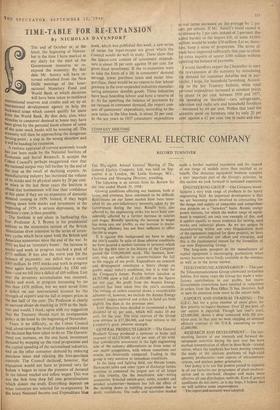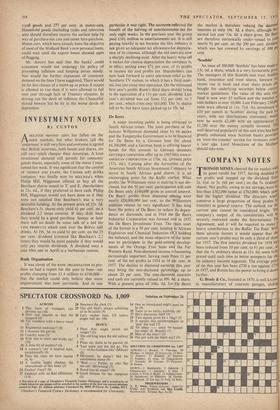TIME-TABLE FOR la - EXPANSION
By NICHOLAS DAVENPORT THE end of October or, at the latest, the beginning of Novem- ber is the time I have marked in my diary for the start of the Government measures to re- expand the economy. By that date Mr. Amory will have re- turned refreshed from the New Delhi meetings of the Inter- national Monetary Fund and World Bank at which decisions
.international development agency to help the backward areas which cannot qualify for loans front the World Bank. By that date, also, what stimulus to consumer demand at home may have been given by the personal loans scheme of some of the joint stock banks will be wearing off. The economy will then be approaching the dangerous turning-point : a step in the wrong direction and it will be heading for recession.
A realistic appraisal of current economic trends
has just been made by the National Institute of !economic and Social Research. It accepts the Cohen Council's perhaps exaggerated. view that the national output may fall further by the end' of the Year as the result of declining exports. As Manufacturing industry has increased the volume of its stocks and its physical assets by 20 per cent. or more in the last three years the Institute is afraid that businessmen will lose their confidence at this point if they see no expansion of domestic demand coming in 1959. Indeed, if they begin cutting down both stocks and investment at the beginning of 1959, a serious depression, in the Institute's view, is then possible.
The Institute is not alone in harbouring this
fear. Professor A. J. brown in his presidential address to the economics section of the British ASsociation drew attention to the series of inven- tory cycles which have upset both the British and American economies since the end of the war. In 1951 we had an 'inventory boom' : the increase in stocks and work in progress reached a peak of £575 million. It was also the worst year for the balance of payments: our deficit was a record £403 million. In 1955 stocks and work in progress Were again heavily accumulated—by £300 mil- lion--and we fell into a deficit of £69 million. Last Year the inventory accumulation was resumed, stocks and work in progress increasing by no less- than £450 _million, but we were saved from a deficit on our international account by the strength of exports and the fall in import prices in the last half of the year. The Professor is clearly as nervous about de-stocking in 1959 as the Insti- tute and would, I think, agree with my suggestion that the Treasury should start its re-expansion policy at the latest by the beginning of November.
There is no difficulty, as the Cohen Council
said, about raising the level of home demand once the decision has been taken to do so. The Govern- ment can increase, on the one hand, investment demand by stepping up the road programme and the capital spending of the nationalised industries, and on the other consumer demand by reducing Purchase taxes and relaxing the hire-purchase controls. The Council declared, however, that expansion would not have to 'proceed very far before it began to raise the pressure of demand in the labour market and inflate wages. This was not the first time they fell into generalisations Which distort the truth. Everything depends on what industries are selected for re-expansion. In the latest National Income and Expenditure blue
book, which was published this week, a new series of tables for input-output are given which the Council would do well to study. These show that the labour-cost content of consumers' expendi- ture is about 38 per cent. against 58 per cent, for gross fixed investment. If the re-expansion were to take the form of a lift in consumers' demand through lower purchase taxes and easier hire- purchase, there would be no reason to fear labour pressure in the over-expanded industries manufac- turing consumer durable goods. These industries have been hoarding labour and have a reserve of it. As for upsetting the balance of payments by an increase in consumer demand, the import con- tent of consumers' expenditure, according to the new tables in the blue book, is about 20 per cent. In the ten years to 1957 consumers' expenditure in real terms increased on the average by 2 per cent. per annum. If Mr. Amory's boost caused it to increase by 3 per cent. instead of 2 percent. the added burden to the import bill, of some £4,000 million, would be under £30 million. Let us, there- fOre. keep a sense of proportion. The terms of trade have improved sufficiently this year to allow for extra imports of nearer £300 million without upsetting the balance of payments.
I would therefore expect the Chancellor to start the re-expansion of the economy by stimulating the demand for consumer dutables and in par- ticular, I hope, for household furnishing. Accord- ing to the last Treasury bulletin, while total personal expenditure increased at constant prices by about 14 per cent. between 1950 and 1957, the spending on 'durables'—cars, refrigerators, television and radio sets and hOusehold furniture —increased by 64 per cent. Within that total the amounts spent on furnitUre rose by only 20 per cent. against a 62 per cent. rise in radio and elec-
trical goods and 277 per cent. in motor-cars, ..Household goods (including radio and television sets) should therefore receive the earliest help by way of purchase-tax cuts and easier hire-purchase. Motor-cars, which have already been the objective of most of the Midland Bank's new personal loans, could wait until the export boom showed signs of flagging.
Mr. Amory has said that the banks' credit expansion would not endangej his policy of preventing inflation and keeping prices steady. Nor would the further expansion of consumer demand on the lines I have suggested. There would be far less chance of a move-up in prices if output is allowed to rise than if it were allowed to fall next year through lack of Treasury stimulus. In driving out the devil of inflation the Chancellor should beware lest he let in the worse devils of depression.



































 Previous page
Previous page